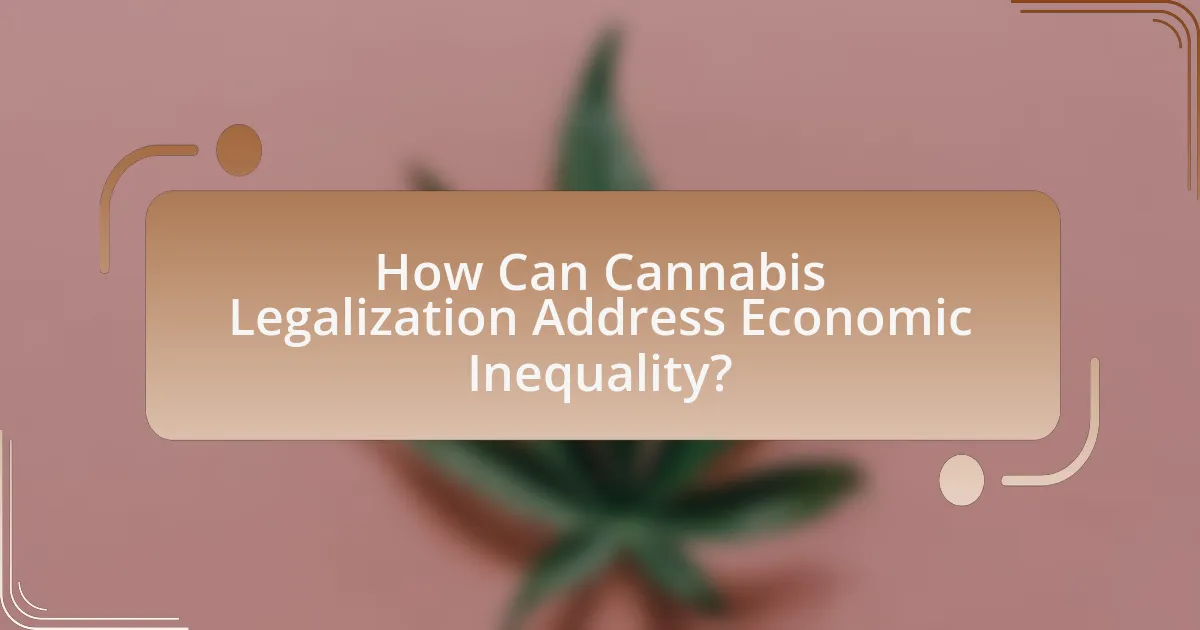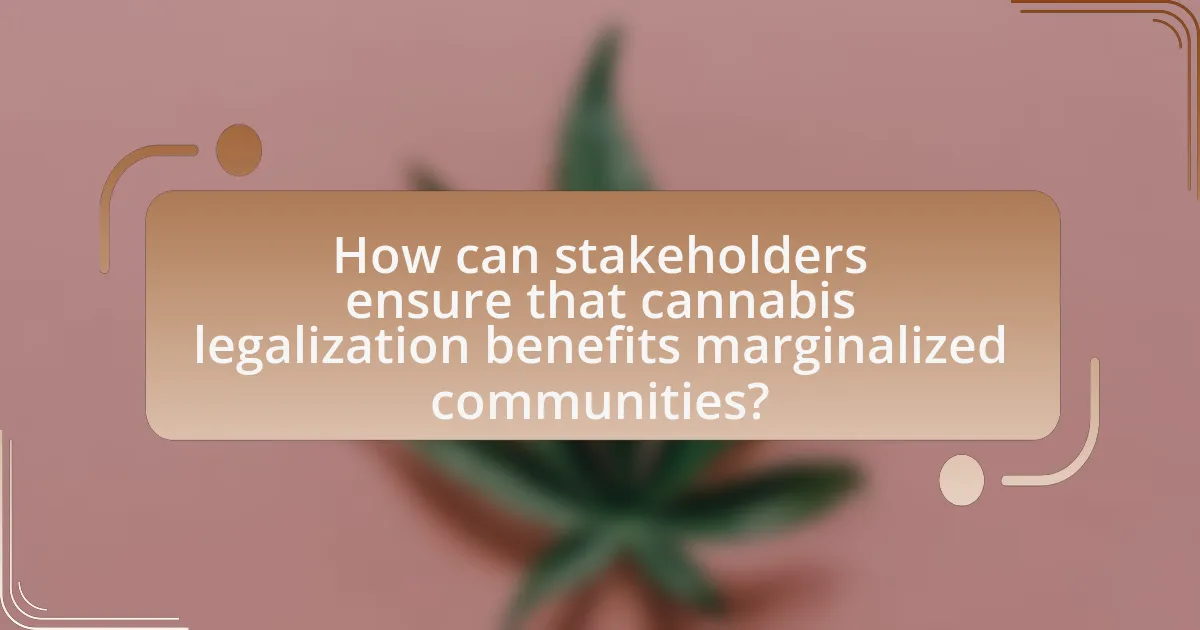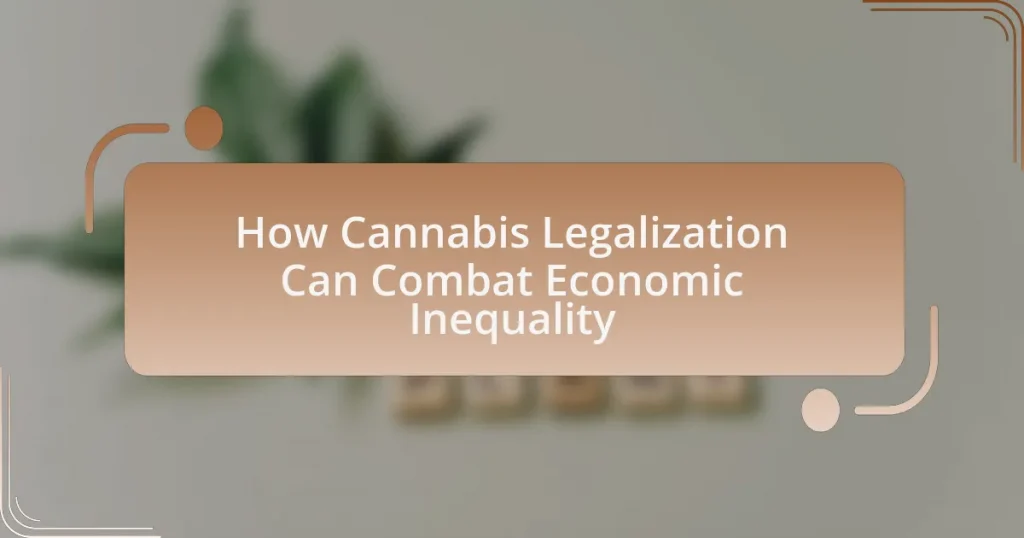Cannabis legalization is presented as a potential solution to combat economic inequality by generating tax revenue, creating jobs, and reducing criminal justice costs. The article outlines how legal cannabis markets, such as Colorado’s, have produced significant tax income that supports public services in lower-income communities. It highlights the job creation potential of the cannabis industry, particularly in underserved areas, and discusses the role of cannabis taxation in funding social programs. Additionally, the article addresses the historical injustices related to drug enforcement and emphasizes the importance of equitable access to the cannabis industry for marginalized communities. Strategies for promoting diversity and ensuring that cannabis legalization benefits these communities are also explored.

How Can Cannabis Legalization Address Economic Inequality?
Cannabis legalization can address economic inequality by generating tax revenue, creating jobs, and reducing criminal justice costs. Legal markets for cannabis have been shown to produce significant tax income; for instance, Colorado generated over $1.7 billion in tax revenue from cannabis sales between 2014 and 2020, which has been allocated to education, healthcare, and infrastructure, benefiting lower-income communities. Additionally, the cannabis industry creates employment opportunities, with estimates suggesting that legal cannabis could create over 1 million jobs by 2025 in the United States alone. Furthermore, legalization reduces the financial burden on the criminal justice system by decreasing arrests and incarceration rates for cannabis-related offenses, which disproportionately affect marginalized communities. This shift not only alleviates costs associated with law enforcement but also allows for reinvestment in community services that support economic development and social equity.
What are the key economic disparities that cannabis legalization can impact?
Cannabis legalization can significantly impact key economic disparities such as income inequality, employment opportunities, and tax revenue distribution. Legalization creates a regulated market that generates jobs in cultivation, distribution, and retail, thereby reducing unemployment rates, particularly in marginalized communities. For instance, a report from the Leafly Jobs Report indicated that the cannabis industry created over 300,000 jobs in the United States by 2021, providing economic opportunities in areas with high unemployment. Additionally, tax revenues from cannabis sales can be allocated to public services, such as education and healthcare, which can help bridge the gap in funding for underserved communities. States like Colorado have generated hundreds of millions in tax revenue since legalization, demonstrating how these funds can be reinvested to address economic disparities.
How does cannabis legalization create job opportunities in underserved communities?
Cannabis legalization creates job opportunities in underserved communities by establishing a new industry that requires a diverse workforce for cultivation, distribution, and retail operations. This industry can generate thousands of jobs, as evidenced by a report from the Leafly Jobs Report, which indicated that the legal cannabis industry supported over 300,000 jobs in the United States as of 2021. Furthermore, legalization often includes provisions for social equity programs aimed at providing training and resources to individuals from marginalized backgrounds, thereby directly addressing economic disparities. These initiatives can lead to increased employment rates and economic revitalization in areas that have historically faced high unemployment and limited economic opportunities.
What role does cannabis taxation play in funding social programs?
Cannabis taxation plays a significant role in funding social programs by generating substantial revenue that can be allocated to various public services. For instance, states like Colorado have reported over $1 billion in tax revenue since legalizing cannabis in 2014, with a portion of these funds directed towards education, healthcare, and substance abuse programs. This financial support helps address social inequalities by providing resources for communities that may lack adequate funding, thereby enhancing access to essential services and promoting overall social welfare.
Why is cannabis legalization considered a tool for social equity?
Cannabis legalization is considered a tool for social equity because it aims to rectify historical injustices related to drug enforcement, particularly against marginalized communities. Legalization can reduce the disproportionate impact of criminalization on these groups, as evidenced by studies showing that Black and Latino individuals have been arrested for cannabis offenses at significantly higher rates than their white counterparts, despite similar usage rates. Furthermore, legalization creates economic opportunities through job creation and tax revenue, which can be reinvested in communities that have been adversely affected by past drug policies. For instance, states like California have implemented social equity programs that provide support and resources to individuals from communities impacted by the war on drugs, thereby promoting economic empowerment and reducing inequality.
How can cannabis legalization help rectify historical injustices?
Cannabis legalization can help rectify historical injustices by addressing the disproportionate impact of drug criminalization on marginalized communities. Historical data shows that Black and Latino individuals have been arrested for cannabis-related offenses at significantly higher rates than their white counterparts, despite similar usage rates. For instance, a 2020 report from the American Civil Liberties Union indicated that Black individuals are 3.64 times more likely to be arrested for cannabis possession than white individuals. Legalization can lead to expungement of past convictions, reducing barriers to employment and housing for those affected. Additionally, it can create economic opportunities through regulated markets, allowing communities historically harmed by prohibition to benefit from cannabis sales and taxation. This approach not only acknowledges past injustices but actively works to dismantle the systemic inequalities that have persisted.
What measures can be implemented to ensure equitable access to the cannabis industry?
To ensure equitable access to the cannabis industry, implementing targeted policies such as social equity programs, financial assistance for minority-owned businesses, and streamlined licensing processes is essential. Social equity programs can provide training, resources, and support to individuals from communities disproportionately affected by cannabis prohibition, thereby fostering inclusivity. Financial assistance, including grants and low-interest loans, can help minority entrepreneurs overcome barriers to entry, as studies indicate that access to capital is a significant hurdle for these groups. Additionally, simplifying the licensing process can reduce bureaucratic obstacles, making it easier for diverse applicants to enter the market. These measures collectively promote fairness and diversity within the cannabis industry, addressing historical inequities.

What are the potential economic benefits of cannabis legalization?
The potential economic benefits of cannabis legalization include increased tax revenue, job creation, and reduced law enforcement costs. Legalizing cannabis allows governments to impose taxes on its sale, generating significant revenue; for example, Colorado collected over $1.7 billion in cannabis tax revenue from 2014 to 2021. Additionally, the cannabis industry creates jobs in cultivation, distribution, and retail, contributing to employment growth; the industry is projected to create over 1 million jobs by 2025 in the United States. Furthermore, legalization reduces law enforcement expenditures related to cannabis prohibition, allowing funds to be redirected to other community services. These factors collectively illustrate how cannabis legalization can enhance economic stability and growth.
How does cannabis legalization stimulate local economies?
Cannabis legalization stimulates local economies by generating tax revenue, creating jobs, and fostering local business growth. For instance, states like Colorado have reported over $1 billion in tax revenue since legalization in 2014, which has been allocated to public services such as education and infrastructure. Additionally, the cannabis industry has created thousands of jobs, with the Bureau of Labor Statistics noting that the sector employs over 300,000 workers in the U.S. Furthermore, local businesses benefit from increased consumer spending in cannabis-related establishments, which can lead to a multiplier effect in the economy. This economic activity contributes to overall economic growth and can help reduce economic inequality by providing opportunities in underserved communities.
What are the expected revenue streams from legalized cannabis sales?
The expected revenue streams from legalized cannabis sales include tax revenue, licensing fees, and ancillary business growth. Tax revenue is generated through sales taxes imposed on cannabis products, which can significantly contribute to state and local budgets; for example, Colorado collected over $387 million in cannabis tax revenue in 2020. Licensing fees are charged to businesses for the right to cultivate, distribute, or sell cannabis, providing additional income to regulatory bodies. Furthermore, the growth of ancillary businesses, such as packaging, marketing, and security services, creates jobs and stimulates economic activity, further enhancing overall revenue.
How can cannabis businesses contribute to community development?
Cannabis businesses can contribute to community development by creating jobs, generating tax revenue, and supporting local initiatives. These businesses often employ a diverse workforce, which can reduce unemployment rates in underserved areas. For example, in states where cannabis is legalized, such as Colorado, the industry has created thousands of jobs, with the Colorado Department of Revenue reporting over 41,000 jobs in the cannabis sector as of 2021. Additionally, cannabis businesses contribute to local economies through tax revenues that can be reinvested in community services, such as education and infrastructure. In California, cannabis tax revenue has funded programs aimed at youth services and public health, demonstrating a direct link between the industry and community enhancement. Furthermore, many cannabis companies engage in corporate social responsibility initiatives, supporting local charities and community projects, which fosters a sense of community and addresses social issues.
What challenges might arise from cannabis legalization in relation to economic inequality?
Cannabis legalization may exacerbate economic inequality by creating barriers to entry for marginalized communities. As the legal cannabis market develops, established businesses with capital and resources often dominate, sidelining smaller, minority-owned enterprises. For instance, a report from the American Civil Liberties Union highlights that Black individuals are disproportionately arrested for cannabis-related offenses, which can hinder their ability to participate in the legal market. Additionally, high licensing fees and regulatory hurdles can prevent low-income individuals from entering the industry, further entrenching existing economic disparities.
How can regulatory frameworks be designed to prevent monopolies in the cannabis market?
Regulatory frameworks can be designed to prevent monopolies in the cannabis market by implementing strict licensing requirements, promoting competition through tiered licensing systems, and enforcing anti-trust laws. These measures ensure that no single entity can dominate the market, thereby fostering a diverse range of businesses. For instance, jurisdictions that have adopted a limited number of licenses per region have seen increased market participation, which helps to maintain competitive pricing and product variety. Additionally, enforcing anti-trust regulations can deter mergers and acquisitions that would lead to monopolistic control, as evidenced by the Federal Trade Commission’s actions in various industries to maintain market competition.
What are the risks of gentrification in areas with newly legalized cannabis businesses?
The risks of gentrification in areas with newly legalized cannabis businesses include displacement of low-income residents, increased property values, and changes in community demographics. As cannabis businesses enter these neighborhoods, they often attract higher-income individuals and investors, leading to rising rents and property prices. For example, a study by the Economic Policy Institute found that neighborhoods with cannabis dispensaries experienced a 20% increase in housing costs within two years of legalization. This economic pressure can force long-term residents out of their homes, disrupting established communities and exacerbating economic inequality.

How can stakeholders ensure that cannabis legalization benefits marginalized communities?
Stakeholders can ensure that cannabis legalization benefits marginalized communities by implementing equitable policies that prioritize access to the cannabis industry for these groups. This includes establishing social equity programs that provide financial assistance, training, and resources to individuals from marginalized backgrounds, enabling them to participate in the legal cannabis market. For instance, states like Illinois have enacted social equity provisions that allocate licenses and funding specifically for applicants from communities disproportionately affected by past cannabis prohibition. Additionally, stakeholders can advocate for the reinvestment of tax revenues from cannabis sales into community services, such as education and healthcare, which directly support marginalized populations. These measures are supported by research indicating that inclusive policies can help rectify historical injustices and promote economic opportunities for disadvantaged communities.
What strategies can be employed to promote diversity in the cannabis industry?
To promote diversity in the cannabis industry, companies can implement targeted hiring practices, establish mentorship programs, and create partnerships with minority-owned businesses. Targeted hiring practices involve actively recruiting from underrepresented communities, which can increase workforce diversity. Mentorship programs can support individuals from diverse backgrounds by providing guidance and resources to navigate the industry. Additionally, partnerships with minority-owned businesses can foster economic opportunities and ensure that diverse voices are included in decision-making processes. Research indicates that diverse teams can enhance innovation and profitability, making these strategies not only socially responsible but also beneficial for business outcomes.
How can mentorship programs support minority entrepreneurs in cannabis?
Mentorship programs can support minority entrepreneurs in cannabis by providing essential guidance, resources, and networking opportunities that are often lacking in underserved communities. These programs facilitate access to industry knowledge, helping minority entrepreneurs navigate regulatory challenges and business operations specific to the cannabis sector. For instance, a study by the National Cannabis Industry Association found that mentorship significantly increases the likelihood of business success, particularly for minority-owned enterprises, by offering tailored advice and fostering connections with established industry leaders. This support can lead to improved business strategies, increased funding opportunities, and ultimately, greater economic empowerment within minority communities.
What role do community organizations play in advocating for equitable cannabis policies?
Community organizations play a crucial role in advocating for equitable cannabis policies by mobilizing grassroots support, educating the public, and influencing policymakers. These organizations often represent marginalized communities disproportionately affected by past cannabis prohibition, thereby ensuring that their voices are heard in the legislative process. For instance, organizations like the Drug Policy Alliance have actively campaigned for policies that prioritize social equity, such as expunging criminal records for cannabis-related offenses and allocating resources to communities harmed by the War on Drugs. Their advocacy efforts are supported by data showing that equitable cannabis policies can help reduce economic disparities and promote social justice, ultimately contributing to a more inclusive cannabis industry.
What best practices can be adopted to maximize the economic benefits of cannabis legalization?
To maximize the economic benefits of cannabis legalization, jurisdictions should implement a comprehensive regulatory framework that includes equitable licensing, taxation strategies, and community reinvestment initiatives. Equitable licensing ensures that diverse entrepreneurs, particularly those from communities disproportionately affected by past cannabis prohibition, have access to the market, fostering economic inclusion. Taxation strategies should balance revenue generation with affordability for consumers, preventing black market competition while ensuring funds are allocated to public services and community development. Community reinvestment initiatives can direct a portion of cannabis tax revenues to support education, healthcare, and job training programs in underserved areas, thereby addressing economic inequality. Evidence from states like Colorado, which generated over $1.5 billion in tax revenue since legalization, demonstrates that well-structured cannabis policies can significantly contribute to local economies and social equity.
How can local governments effectively allocate cannabis tax revenues for community improvement?
Local governments can effectively allocate cannabis tax revenues for community improvement by prioritizing funding for public health, education, and infrastructure projects. For instance, a study by the Colorado Department of Revenue reported that cannabis tax revenues contributed over $1 billion to state and local governments since legalization in 2014, with significant portions directed towards school construction and mental health services. By establishing transparent budgeting processes and engaging community stakeholders, local governments can ensure that these funds address the specific needs of their communities, thereby enhancing social equity and economic development.
What educational initiatives can help inform communities about cannabis opportunities?
Educational initiatives that can inform communities about cannabis opportunities include community workshops, informational seminars, and online courses focused on cannabis cultivation, business management, and legal regulations. These initiatives provide essential knowledge and skills that empower individuals to engage in the cannabis industry, which has been shown to create jobs and stimulate local economies. For instance, a report by the National Cannabis Industry Association indicates that the legal cannabis industry has generated over 300,000 jobs in the United States, highlighting the economic potential of informed community participation.


